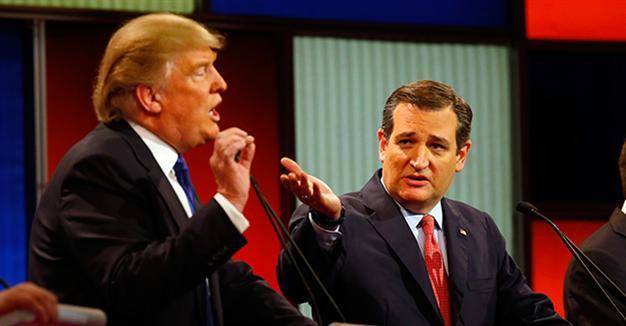Cruz, Trump split four states in setback for Republican establishment
WASHINGTON – Reuters

Republican presidential candidates, businessman Donald Trump and Sen. Ted Cruz, R-Texas, argue a point during a Republican presidential primary debate at Fox Theatre, Thursday, March 3, 2016, in Detroit. AP Photo
Republican presidential hopeful Ted Cruz split victories in four nominating contests with front-runner Donald Trump on March 5, bolstering Cruz’s argument that he represents the party’s best chance to stop the brash New York billionaire.The results were a repudiation of a Republican establishment that has bristled at the prospect of either Cruz or Trump winning the party’s nomination and has largely lined up behind U.S. Senator Marco Rubio of Florida, who was shut out in all four contests.
“I think it’s time that he dropped out of the race,” Trump said of Rubio after the contests. “I want Ted one on one.”
Cruz won Kansas and Maine on March 5, while Trump won the bigger states of Louisiana and Kentucky, holding onto his lead in the race for the Republican nomination for the Nov. 8 presidential election, even though Cruz captured more delegates on March 5.
The next big contest, and a crucial one, will be the March 8 primary in the industrial state of Michigan. Republicans in three other states, Mississippi, Idaho and Hawaii, also will vote on March 8.
In the Democratic race, front-runner Hillary Clinton won in Louisiana, and her rival Bernie Sanders, a U.S. senator from Vermont, won in Kansas and Nebraska, in results that did not substantially change Clinton’s big delegate lead.
Clinton has opened up a big delegate lead and Sanders might have a tough time making up the difference. All states in the Democratic race award their delegates proportionally, meaning Clinton can keep piling up delegates even in states she loses. The three states holding Democratic contests on March 6 had a total of 109 delegates at stake.
The four Republican contests on March 6 together accounted for just 155 delegates. Cruz won 64 delegates on March 6, while Trump took 49.
On March 15, the delegate-rich states of Florida, Illinois, Ohio, Missouri and North Carolina will vote. Both Florida and Ohio use the winner-take-all method to allocate Republican delegates, making the stakes in those states particularly high. All of the Republican contests on March 6, and through March 14, award delegates proportionate to the popular vote, although some states set minimum thresholds to qualify for any delegates.
















